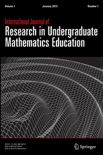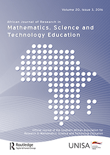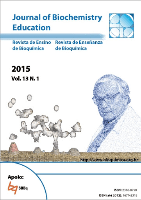
REDIMAT-Revista de Investigacion en Didactica de las Matematicas
Scope & Guideline
Advancing the Frontiers of Mathematics Education
Introduction
Aims and Scopes
- Mathematics Education Research:
The journal emphasizes empirical and theoretical research in mathematics education, exploring how students learn mathematics and the factors influencing their understanding. - Teacher Professional Development:
It highlights the importance of teacher training and professional development, investigating effective strategies for enhancing teachers' mathematical knowledge and teaching practices. - Integration of Technology in Mathematics Teaching:
A significant focus on the use of digital technologies and innovative tools in teaching mathematics, examining their impact on student engagement and learning outcomes. - Active Learning Methodologies:
The journal promotes research on active teaching methodologies that encourage student participation and critical thinking in mathematics classrooms. - Cultural and Contextual Influences in Mathematics Education:
It explores how cultural, social, and contextual factors affect mathematics teaching and learning, including the incorporation of indigenous knowledge and diverse student backgrounds. - Assessment and Evaluation in Mathematics Education:
Research on various assessment methods and their implications for learning and teaching mathematics, including formative and summative assessment practices.
Trending and Emerging
- Digital Technology Integration:
There is a significant increase in research on integrating digital technology into mathematics education, including studies on the impact of tools like GeoGebra and eye-tracking technology. - Collaborative Learning and Teacher Networks:
Emerging themes around professional collaboration among teachers and the development of teacher networks for sharing best practices and experiences are becoming more prevalent. - Metacognition and Mathematical Thinking:
A growing focus on metacognitive strategies and their role in developing mathematical thinking among students has emerged, indicating a shift towards understanding thought processes in learning. - Culturally Relevant Pedagogy:
Research that incorporates culturally relevant pedagogy, including indigenous knowledge in mathematics, is trending, reflecting a broader commitment to diversity and inclusivity in education. - Gamification in Education:
The use of gamification strategies in mathematics teaching is gaining attention, as educators seek to enhance engagement and motivation among students through game-based learning.
Declining or Waning
- Traditional Teaching Methods:
There is a noticeable decline in the focus on traditional, lecture-based teaching methods, as the journal shifts towards more innovative and interactive pedagogical approaches. - Mathematics Content Knowledge without Contextual Application:
Research emphasizing pure mathematics content knowledge without considering its application in real-world or contextual settings has become less prominent, reflecting a move towards practical and applied mathematics education. - Standardized Testing and Assessment:
Themes surrounding standardized testing and conventional assessment methods are appearing less frequently, as the journal increasingly prioritizes formative and alternative assessment strategies.
Similar Journals

International Journal of Research in Undergraduate Mathematics Education
Advancing the Future of Mathematics EducationInternational Journal of Research in Undergraduate Mathematics Education is a premier peer-reviewed journal published by Springer International Publishing AG, dedicated to the advancement of research and scholarship in the field of undergraduate mathematics education. With an ISSN of 2198-9745 and an E-ISSN of 2198-9753, this journal serves as a crucial platform for educators, researchers, and policymakers to disseminate innovative findings and pedagogical strategies that enhance mathematical understanding among undergraduates. Positioned in the esteemed Q2 ranking in both the Education and Mathematics (miscellaneous) categories for 2023, it boasts a respectable Scopus ranking—17th out of 90 in Mathematics and 578th out of 1543 in Social Sciences (Education), placing it in the top percentiles of both fields. The open access format ensures that research is widely accessible, fostering collaboration and knowledge-sharing across the global academic community. Since its inception in 2016, the journal has been committed to publishing high-quality research addressing various dimensions of mathematics education, making it an essential resource for those engaged in enhancing educational practices and outcomes.

International Electronic Journal of Mathematics Education
Bridging Theory and Practice in Mathematics EducationInternational Electronic Journal of Mathematics Education (IEJME) is a premier platform dedicated to advancing the field of mathematics education through rigorous research and innovation. Published by MODESTUM LTD, this interdisciplinary journal focuses on the pedagogical, theoretical, and empirical aspects of mathematics education, facilitating a deep understanding of teaching practices, learning methods, and curriculum development. With its commitment to open access, IEJME ensures that research findings are accessible to a global audience, fostering collaborative efforts among educators, researchers, and practitioners. The journal has maintained a commendable position in academic rankings, holding a Rank of #114/399 in General Mathematics and #782/1543 in Education within Scopus, highlighting its significant contribution to the scholarly community. By publishing high-quality research from 2009 to 2016 and 2021 to 2024, IEJME continues to serve as an essential resource for those invested in enhancing mathematical understanding in educational contexts, inspiring future generations of mathematicians and educators.

Teaching of Mathematics
Advancing Effective Strategies for Mathematics LearningTeaching of Mathematics is an esteemed open-access journal devoted to the field of mathematics education, published by DRUSTVO MATEMATICARA SRBIJE in Serbia. Since its inception in 1998, the journal aims to foster scholarly dialogue and disseminate research findings that contribute to the effective teaching and learning of mathematics. Although it currently holds a Q4 ranking in both Education and Miscellaneous Mathematics categories, the journal is dedicated to providing a platform for innovative pedagogical strategies, theoretical discussions, and empirical studies. With an ISSN of 1451-4966 and an E-ISSN of 2406-1077, Teaching of Mathematics offers open access to its content, ensuring that researchers, educators, and students can freely benefit from its contributions. As it converges towards 2024, the journal aspires to enhance its impact and influence within the mathematical education community, encouraging all stakeholders to share their insights and advancements in this critical area of study.

African Journal of Research in Mathematics Science and Technology Education
Exploring New Frontiers in Mathematics and Technology PedagogyAfrican Journal of Research in Mathematics Science and Technology Education is a distinguished academic journal, published by Routledge Journals, Taylor & Francis Ltd, dedicated to advancing knowledge in the fields of mathematics, science, and technology education within the African context. With an ISSN of 1811-7295 and an E-ISSN of 2469-7656, this journal has been a crucial platform for scholarly discourse since its inception in 1997, steadily gaining reputation and impact among researchers, educators, and policymakers. The journal features a rigorous peer-review process, ensuring that high-quality research garners visibility across various disciplines, as evidenced by its Quartile rankings in Computer Science Applications, Education, Engineering, Mathematics, and Physics and Astronomy. With its commitment to serving the educational community and fostering innovative practices, the African Journal of Research in Mathematics Science and Technology Education plays a pivotal role in shaping the future of STEM education in Africa and beyond.

Journal of Mathematics Teacher Education
Shaping the Future of Mathematics Education WorldwideJournal of Mathematics Teacher Education, published by SPRINGER, serves as a pivotal platform for scholarly communication in the fields of Education and Mathematics. With a distinguished Q1 ranking in both disciplines and exceptional Scopus rankings—placing it in the top 94th percentile for Mathematics and the 84th percentile for Education—the journal is dedicated to advancing research and practice in mathematics education from a global perspective. Established in 2005 and converging towards 2024, it invites contributions that investigate innovative teaching strategies, curriculum development, and teacher education methodologies. Although the journal does not offer Open Access, its rich collection of empirical studies, reviews, and theoretical articles provides invaluable resources for educators, researchers, and students aiming to elevate the quality of mathematics instruction. Situated in Dordrecht, Netherlands, the Journal of Mathematics Teacher Education remains a significant asset to the academic community, fostering discussions that drive progress and enhance student learning experiences.

International Journal for Technology in Mathematics Education
Empowering educators with cutting-edge technological insights.International Journal for Technology in Mathematics Education (ISSN: 1744-2710, E-ISSN: 2045-2519) is a pioneering platform published by Research Information Ltd that focuses on the interplay between technology and mathematics education. Established to bridge the gap between pedagogical practices and technological advancements, this journal connects researchers, educators, and practitioners in a bid to enhance teaching methodologies and optimize learning outcomes in mathematics. Although its coverage in Scopus was discontinued after 2020, it continues to be a vital resource for those interested in the integration of technology into educational settings. With its significant emphasis on interdisciplinary approaches, the journal has garnered attention in the realms of social sciences and computer science, with Scopus rankings reflecting its niche contributions. This journal is crucial for professionals aiming to explore innovative techniques in mathematics education, making it an invaluable addition to any academic library.

International Journal of Education in Mathematics Science and Technology
Transforming educational outcomes through impactful research and practice.The International Journal of Education in Mathematics Science and Technology (ISSN: 2147-611X, E-ISSN: 2147-611X) is an esteemed publication dedicated to advancing knowledge and research in the fields of mathematics, science, and technology education. Published by Necmettin Erbakan University in Turkey, this journal serves as a vital platform for educators, researchers, and professionals to disseminate innovative methodologies, pedagogical strategies, and educational technologies. With a commendable Q2 ranking in both the Education and Mathematics categories for the year 2022, it clearly exemplifies its impact in these domains, boasting a Scopus rank of #19 out of 74 in Mathematics (miscellaneous) and a position in the 75th percentile. Although the journal has transitioned into open access, it remains committed to fostering a rich dialogue among scholars and practitioners dedicated to enhancing educational outcomes in mathematics and science. Researchers and educators interested in contributing to pedagogical advancements are encouraged to submit their work, thereby playing a part in influencing the future of education.

Mathematics Enthusiast
Advancing mathematical discourse for a brighter future.The Mathematics Enthusiast is a premier open-access journal published by the University of Montana, Department of Mathematical Sciences, dedicated to advancing the field of mathematics through a diverse array of scholarly articles. With its ISSN 1551-3440 and established presence since 2013, the journal aims to foster a collaborative environment for researchers, educators, and students alike by showcasing innovative research and contemporary discussions in the realm of mathematics. As a recognized entity within the field, it holds a category quartile ranking of Q4 in miscellaneous mathematics disciplines and is indexed in Scopus, positioned at Rank #188 out of 399, representing the growing interest and research impact in the mathematical community. The journal is committed to exploring cutting-edge topics and promoting mathematical literacy across various sectors while engaging readers with both theoretical and practical implications of mathematical research. For those interested in the evolving landscape of mathematics, The Mathematics Enthusiast is an essential resource, contributing significantly to academic discourse and professional development.

International Journal of Technology in Education
Shaping Tomorrow's Classrooms with Today’s TechnologyThe International Journal of Technology in Education, published by the International Society for Technology Education & Science (ISTES), serves as a vital platform for researchers, educators, and practitioners devoted to the intersection of technology and educational practices. With an E-ISSN of 2689-2758, this journal aims to showcase innovative research, case studies, and theoretical contributions that explore how emerging technologies can enhance teaching and learning. Although specific metrics like impact factor and HIndex are currently unavailable, the journal is committed to rigorous peer review and high academic standards, ensuring that all published work contributes meaningfully to the evolving landscape of educational technology. As an open-access journal, it strives to make research widely available, fostering collaboration and knowledge sharing among its audience. Whether you are a researcher exploring new horizons or a professional seeking practical applications of technology in education, the International Journal of Technology in Education is an indispensable resource.

Revista de Ensino de Bioquimica
Empowering Educators and Students in the World of BiochemistryRevista de Ensino de Bioquimica, published by the SOC BRASILEIRA BIOQUIMICA & BIOLOGIA MOLECULAR, stands as an essential platform for advancing the field of biochemistry education. With an ISSN of 2318-8790 and an established open access model since 2001, the journal entices a diverse audience including researchers, educators, and students who are committed to the enhancement of teaching methods and learning strategies in biochemistry. The journal is dedicated to promoting innovative pedagogical practices and fostering scholarly dialogue in order to improve educational outcomes and engagement in the biosciences. Notably based in Sao Paulo, Brazil, the journal is pivotal for disseminating vital research and insights that can assist academic institutions and practitioners globally. Readers can access a wealth of knowledge that aims to bridge the gap between biochemical research and education, ensuring the continuous evolution of the discipline.